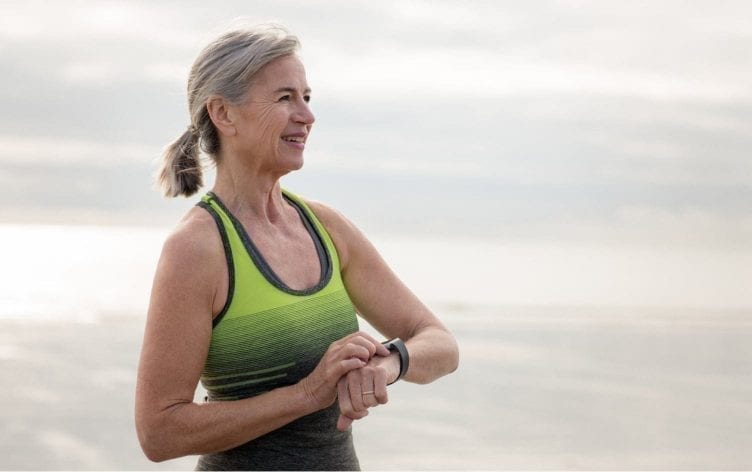
With some things in life, being called a ‘master’ is a good thing; indicating high status in a given field. In athletics, however, being a master is simply a nice way of saying you are an older athlete. This masters status is given at different ages for different sports. For example, in cycling you are a masters athlete at a mere 35 years old, while a golfer isn’t considered a master until age 50.
Whatever your sport of choice, one thing is well-known; the older you are, the more potential health concerns you may have — and nutrition plays a big part in aging and performing. Older athletes have a unique set of nutrition concerns to help support the physiological changes of aging. The best thing you can do while young is take proper care of your body to set yourself up for a long, healthy life of being active.
Of course, during youthful days of endless energy, it’s difficult to focus on what’s best for you 30 years down the road. As an older athlete looking to perform well and stay healthy, every calorie choice should be nutritionally dense to avoid shortfalls.
Here are the main issues of aging and recommendations on eating to age gracefully.
1
A SLOWER METABOLISM
As we age, our resting metabolism drops slowly and steadily — meaning it takes less energy to keep your body functioning as the years go by. This decline has shown to be roughly 2% a year after age 30. Along with this natural metabolic decline, calorie needs drop due to a general decline in activity levels and lean muscle as leisure hobbies become more sedentary. Needing fewer calories doesn’t mean fewer nutrients, however, so each bite should be focused on getting what you need, not what you want.
2
LESS BONE DENSITY
Your bone strength declines with age, leading to an increased risk of fractures and breaks. Calcium and vitamin D intake help to protect the skeletal structure. Aim to consume fortified milks, juices, cereals and tinned fish (sardines/salmon) to get enough of these nutrients daily.
3
LESS LEAN MUSCLE
Lean muscle tissue is lost as the years go by, even in well-trained athletes routinely engaging in hard exercise. To keep your muscle mass intact, make sure protein needs are being met with a variety of plant and animal sources (as these foods offer nutrients outside of protein). Aim for roughly 1.4 grams/kg of body weight for endurance athletes and 1.7 g/kg for strength athletes.
4
LACKING NUTRIENTS
Appetite levels and taste sensations typically decline with age. While this is a good natural balance to a slower metabolism, it can hinder the consumption of nutrient-rich foods. If food seems bland and uninteresting, you are at risk of consuming a diet limited in vital vitamins and minerals. Aim to try new bold flavors and eat by need, not desire.
5
CHRONIC DEHYDRATION
Thirst sensations decrease with age as well, meaning you won’t feel thirsty and might skip out on sipping enough fluids. This is especially important for endurance athletes spending hours sweating in hot, humid temperatures. Drink by time instead of thirst and check urine color (light yellow means well-hydrated). There’s no need to chug water, take small sips throughout the day and add nutrient-rich fluids like fortified 100% juice, milk and smoothies to your diet.
6
LESS ABILITY TO ABSORB NUTRIENTS
All those years of eating whatever you wanted has caught up to you in the form of gastric inflammation. The more inflamed your gut is, the less able it is to absorb nutrients from food. Taking a multivitamin is good way to cover your bases but won’t account for all your needs. The best way to consume vitamins, minerals and phytonutrients is through a well-balanced, colorful diet.
Overall, masters athletes have a slightly different set of nutritional needs due mostly to declining energy needs and higher nutrient requirements. If you’re looking to compete later into life while keeping a generally healthful body, eat a diet that is health-forward. Supplements may help meet needs during this stage of life, but make sure to check with a doctor and dietitian before adding one to your daily regimen.



